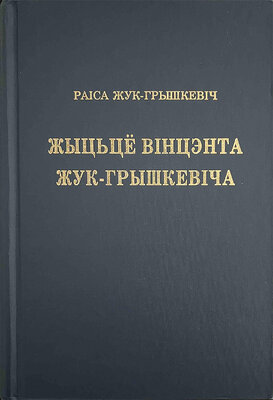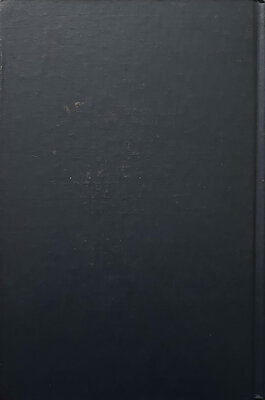Жыцьцё Вінцэнта Жук-Грышкевіча
Раіса Жук-Грышкевіч
Памер: 798с.
Таронта 1993
The Russian Greek Orthodox church in St. Walburg, Sask., for instance was founded “in 1929 by a group of 18 immigrants from Volhynia, who acquired a piece of land, seven and half acres, and erected the church.” (Kanadzki Pravoslavnyi Kalen-dar na 1952 hod). They, and their English speaking children and grandchildren probably are included in the 12,219 persons who gave Russian as their origin and Greek Orthodox as their religion.
Eastern parishes on the other hand had pure Russian parishioners and Russian priests, including a certain number of parishioners who were Byelorussian origin, judging from the spelling of their names.
This indicates that only approximately (in conservative estimation) 50 per cent of the Greek Orthodox group could have been of Byelorussian ethnic origin. As the whole group is 12,219 persons strong - the number of Byelorussians would be - 6,110. The 19,597 Doukhobors did not have any Byelorussian admixture.
The great puzzle is the large group of 13,323 Roman Catholics who did not fit into the Russian picture. We tried to penetrate the curtain, by looking up applications for citizenship, making enquiries, etc. and came to the conclusion that some of them were Latvian Catholics, some Lithuanian Catholics, and a goodly number, we concluded, must be the tribe of the Krivi-chi.
230
You state that “only some countries of Vilna Viovodship,... had Catholics majority, etc.,” and you conclude that in Poland the majority of Byelorussians belonged to the Orthodox faith and only 30 to 33 per cent were Roman Catholics. If you consult the BYELORUSSIAN REVIEW, Vol.3, 1956, “The population of Western Belorussia and Its Resettlement in Poland and the USSDR” by Mikola Valocic, you will find on p. 19-20 statis-
tics of the Bielosdtok region which you consider to be 30-33 per cent Roman Catholic. The author says: “The Bolsheviks willingly gave this territory to Poland in spite of its size because
its population was mainly Byelorussian of Roman denomination, towards which Moscow was hostile.” Catholic
Belaya Padlaska - 66.0% Roman Catholics 13.4% Orthodox
Belastok 60.6% 44 44 9.7% a
Augusto 90.9% 44 a 1.1% a
Bielsk 43.3% a a 10.3% 44
Grodno - 42.0% a ct 36.6% 44
Volkovysk 46.2% cc cc 41.6% 44
Average 61.5% Roman Catholic 22.9% Orthodox
As many Byelorussian immigrants who came to Canada
between the Wars came from these districts, we assume that
about 60 per cent of them will be Roman Catholic. That would explain why the number of Roman Catholics in the Russian origin group was actually larger than the Orthodox group.
The Polish origin group contained 7,744 persons of Greek Orthodox faith, but you are mistaken when you say that “undoubtedly they are nobody else but Byelorussians.” Not all of them were Byelorussians. Applications for citizenship have revealed that a considerable number of Greek Orthodox persons who were included in the Polish origin group came from Vol-hynia, Polessie and - Poland proper, apart from Byelorussian districts. On the other hand, many Poles, Roman Catholics, gave Byelorussian districts as their place of birth which would indicate that they might have been Byelorussians by origin.
You may have noted that Mikola Silvanovic stated in the “Encyclopedia Canadiana” (Vol. 2) the number of persons of Byelorussian origin at between 10,000 an 15,000. We considered this figure too low and using comparative statistics and probability calculations, supported by “Stichproben” from immigration lists and citizenship applications, enquiries in parishes, press notices (obituary notices with biografical sketches) came to the conclusion that approximately 30,000 was nearer
231
the truth. But only about one-sixth of this group cosidered themselves Byelorussians, participated actively or passively in the Byelorussian organized life. Our calculation was based on (a) membership in ethnic societies, (b) the number of subscribers of Byelorussian papers, (c) on membership of parishes. We multiplied the figure by four (the assumed number of members in one family, - although, official statistics show that the number of single persons in the Byelorussian group (as it is in every other immigrant group) was higher than the average and that many families had only one or two children (or none). To this number we added the “safety quotient” and arrived at the figure - 5,000. These are the people who probably belong to the Belorussian Alliance in Canada, to the Byelorussian Association in Canada (should be: Byelorussian National Association, R. Z.-H.), to the parish of St. Cyril Turovski (should be: St. Kiryla of Turau, R. Z.-H.), St. Eufrasinia of Polotsk, participate in the Byelorussian Amateurs’ Art Society of Winnipeg, etc. The remaining thousands are either members of the Federation of Russian Canadians, of the Polish Alliance, Polish National Union, or do not belong to any ethnic organization at all.
In Canada there is no compulsion to belong to this or that organization or ethnic group. Every person is free to choose where he wishes to belong and what he wishes to be called. There are well over one hundred various religious churches and sects in Canada, and nobody dictates to which one you should belong...
My letter is long, but I thought I had to answer your questions. Our Monograph will be for the use of the departments, but if published, it will be also available to other persons on requst.
Yours sincerely,
(Dr.) V. J. Kaye,
National Liaison Officer.”
❖ * *
«Бэры, 12 красавіка, 1959 г.
Вельмі Паважаны Спадар Доктар:
Я вельмі ўдзячны Вам за інфармацыі, зь якіх відаць выразна, што канадыйскія ўлады робяць усё магчымае, 232
каб задэўніць кожнай адзінцы свабоднае выяўленьне на-цыянальнага паходжаньня й даць магчымасьці ў аргані-зацыі асабістага й грамадзкага жыцьця. Гэтыя інфарма-цыі дапамогуць мне ў пераконваньні сваіх суродзічаў аб найлепшых інтэнцыях канадыйскіх уладаў у адносінах да новых імігрантаў.
Я асабіста ведаў аб тым, што канадыйскія ўлады кіру-юцца прындыпамі гуманітарнасьді, дэмакрацыі й свабо-ды, але некаторыя справы былі для мяне незразумелымі, нарыклад, чаму адны нацыянальнасьці маюць свае рубру-кі пры перапісі насельніцтва, а другія ня маюць; чаму ўрадаўцы, што праводзяць перапісь, ня хочуць запісваць беларусаў пад іх нацыянальнасьцяй. Цяпер я разумею, што тэорыя - у гэтым выпадку інструкцыя канадыйскіх уладаў - гэта адна рэч, а практыка - другая рэч. Я далё-кі ад таго, каб бачыць у ўрадаўцаў злую волю. Яны проста не запісваюць беларусаў пад іх надыянальнасьцяй дзеля таго хіба, што для іх такая нацыянальнасьць нязнаная, тым больш, што ў рубрыках нацыянальнасьдяў яе няма. Ня ведаючы-ж што запісаць, як паступіць, яны й зьвярта-юцца да агульнапрынятага ў канадыйскім грамадзтве й прэсе паняцьця нацыянальнасьці - раўназначнага з дзяр-жаўнай прыналежнасьцяй. Калі-ж і ў гэтым паўстае непа-разуменьне, тады яны зьвяртаюцца да акрэсьленьня ў дакумэнтах. I тут то якраз і выходзіць наверх тая нацыя-нальнасьць, якая была запісана ў дакумэнтах беларуса, калі ён зь ведамых прычынаў прабываў у чужым нацыя-нальна лягеры ў Нямеччыне. Тая самая гісторыя выхо-дзіць з акрэсьленьнем роднай мовы, якая асоцыюецца з краінай паходжаньня.
Я не дзіўлюся, што энумэрацыйных лістоў зь белару-скай нацыянальнасьцяй так мала, бо кажная запісь бела-руса здабыта штурмам (падкрэсьлена мною, Р. Ж.-Г.). Гэ-та сказана на аснове практыкі ня толькі маёй, але й усіх беларусаў, якія дамагаліся, каб іх запісалі беларусамі. Я й мая жонка маем шмат прыкладаў з штодзённага жыцьця, спатыкаючыся нават з канадыйскай інтэлігэнцыяй. Пыта-юцца аб нацыянальнасьці, краіне паходжаньня. Назоў “Belorussia,” “Belorussian,” - нічога ім не гаворыць, зараз жа падхопліваюць “Russia,” “Russian.” А калі ўспомніш, што паходзіш зь Беларусі, што была пад Польшчай, тады падхопліваюць “Poland,” ’’Polish.” I трэба добрага тлума-чэньня, каб адказаць на пытаньне, хто мы. Ды ўсё-ж калі
233
зноў спаткаешся з тэй-жа асобай - яна ўсяроўна назаве цябе “Russian” ці “Polish.”
Таксама выглядае справа з урадаўцам, які праводзіць перапіс. Так ці іначай вытлумачыць, пераканаць можа інтэлігэнт, які валодае ангельскай мовай. А што зробіць просты чалавек, якому нават пасвойму цяжка вытлума-чыць сваю нацыянальнасьць, ці паходжаньне, а тым больш паангельску? Вось тады й выплываюць іншыя на-зовы, як “White Russia,” “Whiteruthenia.”
Для акрасьленьня сваёй нацыянальнасьці мы маем толькі адзін назоў - беларусы. Справа-ж увядзеньня назо-ву «Крывічы» мае акадэмічны характар і праводзіцца др. Я. Станкевічам з некалькімі асобамі каля яго. Назовы-ж “White Russia,” “Whiteruthenia” выступаюць пераважна та-ды, калі назоў «Беларусь» трэба вытлумачыць паангельску. Звычайна назовы народаў не тлумачацца на чужую мову. Таму ўжываньне паангельску “Belorussia,” або “Byelorussia” - каб лягчэй вымаўляць, зусім на мейсцы. Бяда аднак у тым, што самі канадыйцы перакладаюць гэта слова на “White Russia” і надаюць яму зьмест, што й “Russia.”
Вы кажаце, Спадар Доктар, што ад 1952 г. ёсьць маг-чымасьць паправіць запісаную нацыянальнасьць пры атрыманьні канадыйскага грамадзянства. You are perfectly right. Але йзноў паглядзім, як гэта выглядае на практы-цы. Кандыдат на атрыманьне канадыйскага грамадзян-ства спатыкаецца з тэй самай гісторыяй, як і пры перапі-су. Судзьдзя, ці ўрадавец звычайна ня ведае, што такое “Belorussia” й зажадае тлумачэньня. Паўторыцца тая са-мая дыскусія з тэй толькі розьніцай, што тут кандыдат мае вялікую аўдыторыю (звычайна экзамены й працэдура атрыманьня грамадзянства адбываецца групова), ён будзе старацца гаварыць паангельску як найлепш, бо калі сьцьвердзіцца слабое веданьне ангельскай мовы, яму мо-гуць ня даць грамадзянства. 3 гэтай жа прычыны ён наа-гул пабаіцца наражацца судзьдзі ці ўрадаўцу, ня вытлу-мачыць належна, што ён хоча, і такім чынам, тут яго за-пішуць як папала. Ен нават і праймацца гэтым ня будзе, бо найважнейшае для яго ёсьць атрыманьне грамадзян-ства, а як ён запісаны, гэта менш важна. Дык і тут добра абаснаванае канадыйскімі ўладамі свабоднае й праўдзівае выяўленьне нацыянальнасьці найчасьцей не асягае мэты.
 КНІГІ ОНЛАЙН
КНІГІ ОНЛАЙН


